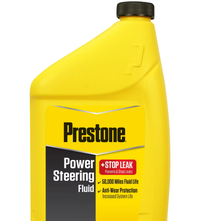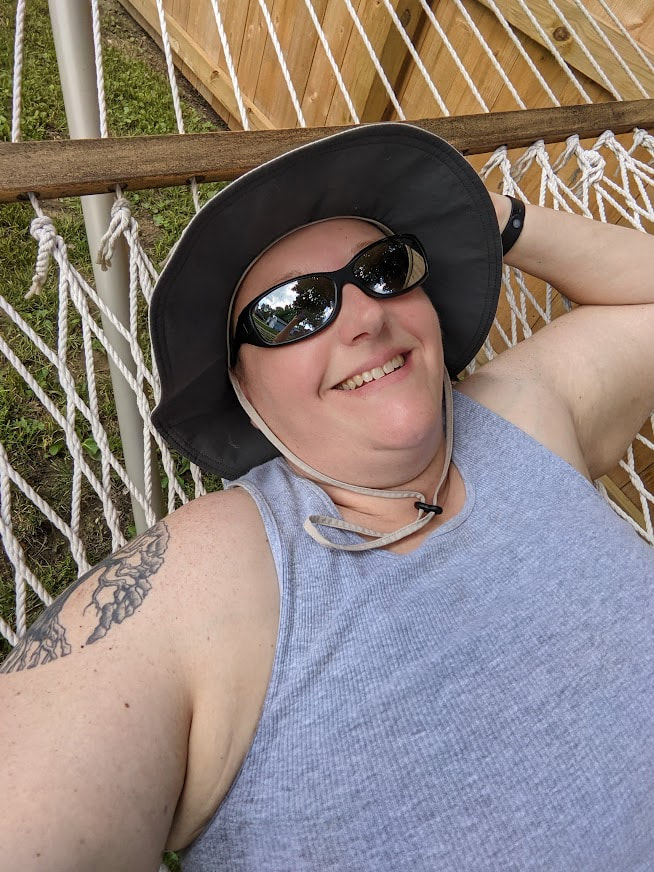 Yesterday morning on my way to work I noticed my truck making a moaning noise. The noise was quieter when driving and idling, but sounded like a baby calf crying for its mother when turning in either direction. Thinking it sounded like something with the truck’s power steering, I turned toward our household’s auto repair shop instead of making the turn to work. Once there, the mechanic confirmed my suspicions: It indeed sounded like something related to the power steering system. What that was couldn’t be determined by simply listening and taking a quick preliminary look. My truck would need to go in for an appointment, and he didn’t have any openings until the following week. At first glance, however, the mechanic did see that the power steering fluid level in the reservoir was low, so he went back into the shop, retrieved a funnel and some power steering fluid, filled the reservoir to the appropriate level, and the moaning stopped. My mechanic must know me well enough to know that I am skeptical of the quick fix because upon hearing the moaning cease, he looked at me and told me that topping off the fluid took care of the symptom, but not the problem itself. He couldn’t be sure where the fluid was going or what (if any) parts might be needed. All he could be sure of is that having the right amount of fluid was the best way to protect the power steering pump from burning up. With that, I followed him into the shop to make an appointment for the following week. And I wish I could have left it at that…but I couldn’t. I didn’t. Because as soon as I crawled back into my truck I was already asking Google what could be leaking in the power steering system and where the fluid could be leaking if not on the ground (at least not that I’ve noticed). On my lunch break and again in the evening, I feverishly searched the internet, YouTube videos, and Honda Ridgeline forums looking for answers to my power steering fluid woes. And I found answers…LOTS of answers. Maybe not to my specific problem, but to ALL KINDS of power steering problems and issues–with dollar amount estimates for the fixes ranging anywhere from $100 to thousands of dollars to fix. The more I found, however, the more I kept wanting to find. So I just kept looking. If you had asked me yesterday what I was looking for, I would have told you I was looking for THE answer. But I know now that because of my limited knowledge of vehicles (I mean, I can change the oil, change a tire, change the air filters, change headlight bulbs, and check for fluids, but not much beyond that) I wouldn’t necessarily know the answer if it hit me in the face. No, what I was looking for was certainty. I wanted to be certain of what was wrong. I wanted to be certain that we could afford to fix what was wrong. I wanted to be certain that we could handle whatever was coming our way. I don’t think I’m alone in this practice. A lot of us, I think, find ourselves in situations where we think we are looking for answers, but are really looking for certainty. We get our test results in the My Chart app before our appointment with the doctor to explain those results, and we feverishly begin “researching” online or among friends what those results mean. All the while being less concerned with the science of it, and more concerned with what it means for our lives, for the quality with which we live our lives, or for how long we might yet have with the one we love. Or we’re offered a different job within our organization, and we think taking that different job would be good for our careers and our bank accounts, but we aren’t sure how it would affect the rest of our lives. So we start polling our friends for feedback, and start looking up articles about what a good “work-life balance” looks like. We calculate how the salary increase would impact our 401k’s and if it will make it easier for us to retire. And we do all of this thinking that we are merely doing our due diligence so that we can make an informed decision, when what we’re really doing is hunting down certainty. We want to be certain that this new job won’t adversely affect our families. We want to be certain that the salary increase will be worth the increased stress. We want to be certain that we won’t come to regret the day that we agreed to accept the new role. The thing is, we’ll never find what we seek. Though we might fool ourselves from time to time, nothing is certain–at least, not certain in the way we are hoping for–and this leaves us vulnerable. As a general rule, we human beings don’t like feeling vulnerable. We don’t like feeling that there is much beyond our control and much that we don’t know. So we Google and research and poll our friends and family trying to keep ourselves from feeling vulnerability–thinking that somehow if we don’t feel vulnerable, we won’t actually be vulnerable. We won’t feel that pit in our stomachs that tells us we’re running out of options. Our brows won’t furrow with worry over what the next turn holds for us. We won’t feel as if we’re on a rollercoaster, barely able to breathe and on the verge of losing our lunch with every new obstacle we encounter in our path. I’m sad to break it to myself and to y’all that there is not enough control or certainty in the world that will allow us to outrun or out-research vulnerability. A great deal of our lives we are asked to take on faith. Not faith as in faking some sunny disposition that everything is going to be okay when every fiber in our being is screaming that it is not, but faith in its truest sense. Faith not for overcoming obstacles, but for experiencing them—all the way through (paraphrased quote from Richard Rohr). So between now and next week’s truck appointment, I’m going to work more on keeping the faith, and less on Google. I’m going to trust that this vulnerability might feel like it’s going to kill me, but it won’t actually. I’m going to focus my energies on what I can do, and work my hardest to leave the rest behind. I’m going to do what I can to experience this obstacle all the way through, and I’m going to invite you to join me in doing the same with obstacles of your own. Keeping the faith with you, Pr. Melissa Comments are closed.
|
Rev. Melissa Sternhagen
Rev. Melissa Sternhagen was called as the pastor of St. Paul Congregational UCC in June of 2020. Prior to her call to St. Paul, Pr. Melissa worked as a hospice chaplain in the Ames, IA area, following pastorates at rural churches in Central Iowa and Southern Illinois. Pr. Melissa is a second-career pastor with a background in agribusiness and production & supply operations. She received her M.Div. from Eden Theological Seminary in St. Louis, MO, and holds a MA Ed. in Adult Education and Training, and a BA in Organizational Communications. Archives
July 2024
Categories |

 RSS Feed
RSS Feed
